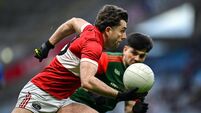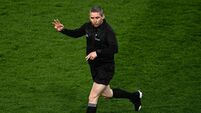Full-time whistle for officials aged over 50
There are approximately 50 whistlers listed for each code at the top level and, according to Croke Park’s Pat Doherty, their database would suggest that eight to ten from each code could be up for retirement under new guidelines.
“We’re seeing the games moving considerably quicker, the players are getting younger,” said Doherty when asked to explain the reasoning behind the move. “We see (the media) speculating once a player turns 30 – you’re retiring him.













